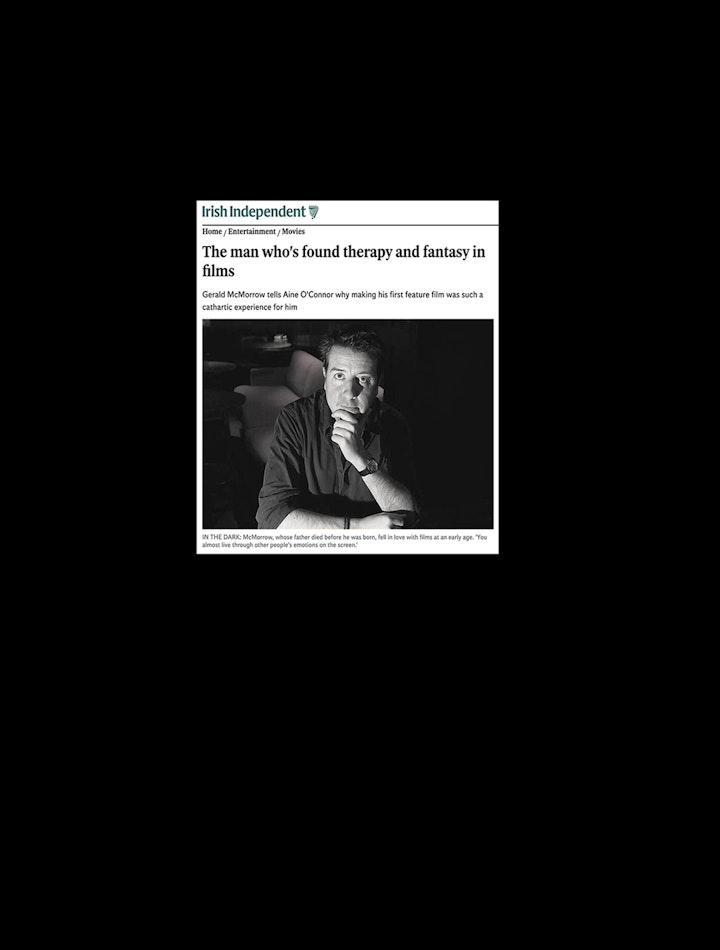Interview by Aine O'Connor
Gerald McMorrow is an unapologetic romantic. Although at first glance his first full-length feature film, Franklyn, seems like the spawn of Batman and Blade Runner, it is in many ways, says its writer and director, a romance. A complex film, Franklyn takes place between modern-day London and the futuristic religion-riven Meanwhile City and revolves around four main characters, all of whom contain a part of their creator. So while it may be a romance, he also likens the filmmaking process to therapy.
At a London screening McMorrow says he was, "roundhoused by a guy who asked why all of the families had only one parent". The questioner had wanted to know if a political statement had been intended, "but I was shocked that I hadn't noticed they were single. That's what I mean about the film being a bit like therapy."
Born in 1969 in London's Notting Hill, McMorrow says, "That sounds great now but back then we were in a basement flat in Chepstow Villas and that was a very, very different place. There was no Richard Curtis!" His parents had been together for 16 years, "They had been a dance team and had the absolutely perfect relationship. (I went back and asked my dad's friends and they said it was true, there were no rows!) I was the lovechild coming along at the end, but my father died a month before I was born so my mother was grieving when I was a baby. She had lost the love of her life."
He fell in love with films and cinema at an early age. "I think it can become a friend to you. I was an only child being brought up by a widow who was working all hours that god sends to get me an education." Not surprisingly he cites Cinema Paradiso as one of his desert island films, saying, "that has rather interesting parallels to my life... in a way what might be lacking in the family unit being made up for by the cinema, those emotions being transplanted into you so you almost live through other people's emotions on the screen rather than your own".
However, that was in hindsight. What captured him first was Star Wars. It was 1977, he was eight. And he was hooked. "I couldn't believe that something like this was having the effect it was having on me so I wanted to do the same thing to other people." He studied film at NYU where from the beginning they were handed cameras and dispatched into Washington Square to make movies. It gave him skills but, more, it gave him, "the enthusiasm and optimism".
In the 90s McMorrow made commercials and music videos for the likes of Catatonia. His first short film, Thespian X in 2002, was highly regarded and won prizes. It was an ambitious project for a short film and from it came the idea for Franklyn, an ambitious project for a first feature. He's very happy with the result, saying, "I love those kind of monkey puzzle films where you just have to pay attention." He likes too that it's "genre busting" but adds, "I think I'll be happier in a couple of years time when I put it on and watch it. It's too close now."
He was also very happy with the cast: Eva Green, who plays two roles, and Ryan Philippe, who surprised McMorrow when they met. "Everyone thinks Ryan's just this LA pretty boy but you've got this incredibly erudite, really, really smart guy whose an incredible actor, born and bred in Philadelphia on the wrong side of the tracks."
McMorrow's love of film persists and he is not precious or picky about what he'll watch, quoting Stephen King's "there's good baloney". He adds that, "having been through this process, it completely reignites my respect for anybody who gets a film made".
Franklyn deals with the subject of fate, love and reality. McMorrow has said that "love and happiness are so intricately entwined with fantasy", and wonders whether cinema, all popular culture, creates fantasy or serves it. "Cinema feeds the notion of what you don't have in an incredibly unhealthy way. And not having that regular family unit or people to tell me that I was being daft, my imagination was honed and whittled by those [cinema] experiences and I probably did a bit of damage because my expectations were high."
It makes for a rude awakening in later life.
He believes the same happens with romance. "Everybody seeks cinematic romance; when Valentine comes around people almost roleplay [according to] the terms and regulations of official romantic love." Failure to get it results in deception. So is mundanity the enemy of romance? "Well, maybe people should be spending more time looking for romance in mundanity."
